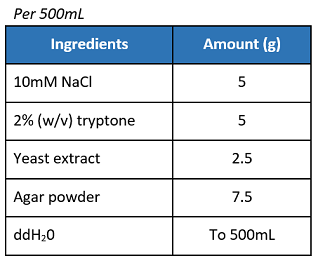| Line 72: | Line 72: | ||
<div class="team1"> | <div class="team1"> | ||
| − | < | + | <h1 class="column full_size"> |
<img src="https://static.igem.org/mediawiki/2016/b/b4/T--Manchester--protocols_bigtitle.png" alt="symbol" style="width:150px;float:left;" /> | <img src="https://static.igem.org/mediawiki/2016/b/b4/T--Manchester--protocols_bigtitle.png" alt="symbol" style="width:150px;float:left;" /> | ||
<h1 class="sub_title">Medium and Buffers</h1> | <h1 class="sub_title">Medium and Buffers</h1> | ||
| − | </ | + | </h1> |
| − | < | + | |
| − | + | <h2 type="button" class="sub_sub_title glucose">20% (w/v) glucose solution </h2> | |
<br /> | <br /> | ||
| Line 101: | Line 101: | ||
</table> | </table> | ||
--> | --> | ||
| − | + | <div class="glucoseinfo"> | |
<img src="https://static.igem.org/mediawiki/2016/2/2f/T--Manchester--protocoltable1.png" alt="table 1" /> | <img src="https://static.igem.org/mediawiki/2016/2/2f/T--Manchester--protocoltable1.png" alt="table 1" /> | ||
| Line 110: | Line 110: | ||
</ol> | </ol> | ||
<br /> | <br /> | ||
| + | </div> | ||
| + | |||
<h2 class="sub_sub_title">50% (w/v) glycerol solution</h2> | <h2 class="sub_sub_title">50% (w/v) glycerol solution</h2> | ||
| Line 171: | Line 173: | ||
<script> | <script> | ||
$(document).ready(function(){ | $(document).ready(function(){ | ||
| − | $(". | + | $(".glucose").click(function(){ |
| − | $(". | + | $(".glucoseinfo").toggle(); |
}); | }); | ||
}); | }); | ||
Revision as of 16:17, 23 September 2016


Medium and Buffers
20% (w/v) glucose solution

- Prepare the solution by mixing the ingredients stated above.
- Sterilize in an autoclave before using it to prepare the SOC medium.
50% (w/v) glycerol solution

- Prepare the solution by mixing the ingredients stated above.
- Sterilize in an autoclave.
*Source from 2015 iGEM Exeter [link = 2015.igem2015 .org/wiki/images/a/ab/Exeter_Glycerol_recipe.pdf]
Electrophoresis buffers
For nucleic acid DNA/RNA separation
- TAE buffer (Tris-acetate-EDTA)
- TBE buffer (Tris-borate-EDTA)
- LB buffer (Lithium borate)

- Prepare the solution by mixing the ingredients stated above.
LB agar (Luria-Bertani agar)
If not using pre-mixed LB agar powder, prepare the materials as below:

- In a 1L Erlenmeyer flask, swirl and mix the solution.
- Cover the top of the flask with a lid/aluminum foil and label with autoclave tape.
- Autoclave the liquid setting for 20 minutes or according to your autoclave's specifications.
- After removing the solution from the autoclave, allow the agar solution to cool to 55°C in an oven or water bath.
- When pouring the LB agar into plates, keep the bench area sterile by working near a flame or Bunsen burner. Alternatively, prepare the plates in a vacuum hood.
- Add the appropriate amount of desired antibiotic (refer the table below) to the solution and swirl to mix.
- Pour approximately 20mL of LB agar per 10cm polystyrene Petri dish.
- Place the lids on the plates and allow them to cool for until the agar is solidified.
- Label the bottom of plates with antibiotic and date before storing in plastic bags or sealed with Parafilm at 4°C.
















